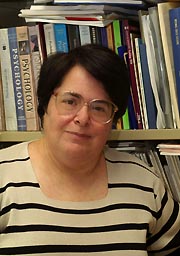|
This is an archived article.
For the latest news, go to the Advance
Homepage
For more archives, go to the Advance Archive/Search Page. |
||
|
Psychologist Seeks to Fight Autism
Through Early Detection By Allison Thompson If Deborah Fein had her way, every child in the state would be screened for autism at a young age, since early detection and intervention are more likely to result in successful treatment of the disorder. Thanks to two federal grants, Fein, a psychology professor, is one step closer to her goal.
In July, Fein received a five-year grant of nearly $500,000 per year from the National Institutes of Health to fund autism early detection work. Last fall, she and her colleagues received a separate grant of $200,000 per year for four years from the U.S. Department of Health and Human Services' Maternal and Child Health Bureau to fund other aspects of the same work. Autism is a developmental disability that typically appears during the first three years of life and is disruptive to social relationships, communication, and imaginative play. It is a very common developmental disability, affecting at least 1 in 500 children. Children who receive early intervention are more likely to develop communication skills and have improved long-term prognoses. "The earlier a child is diagnosed with autism or another pervasive development disorder, the sooner he or she can receive treatment," Fein says. "Time and again, research has shown that early treatment leads to a better outcome. In my clinical practice, I've seen some amazing success stories of children who become essentially typical in their development and attend regular school with no difficulties. Virtually all of them have received aggressive early intervention." The grants allow Fein and her fellow researchers at Stanford University, the University of Washington, and the Yale Child Study Center to screen thousands of children through pediatricians' offices and early intervention centers, and compare three different screening devices. One device, the Modified Checklist for Autism in Toddlers, was created by Diana Robins, a former graduate student of Fein's who is now at Yale, in collaboration with Fein and others using the British Checklist for Autism in Toddlers as a model. Fein and the Yale researchers are comparing the two checklists and a screening device that was developed at Yale. "We're trying to find the best screening device that doesn't miss any children who might have autism, but also doesn't over-diagnose ," Fein says. In order to compare the three checklists, parents of children aged 18 to 24 months are asked to spend five to 10 minutes completing the screening devices when they take their children to the doctor. The doctors send the completed questionnaires to Fein to be scored. If the results indicate that a child could have autism, the researchers contact the physician and the parent. The parent is told which of the answers were problematic and is invited to bring the child in for a free evaluation. During that appointment, the child is given more substantial tests. If those tests indicate that the child has autism or another developmental disorder, the parents receive recommendations regarding the type and intensity of treatment and are offered help finding services. A secondary goal of the project is to evaluate treatments for autism. Children who were diagnosed with autism and received treatment at an early age will be examined again at the age of four to determine what type of intervention results in the most successful treatment. The site where the intervention services were delivered and the number of hours per week the children were seen will also be evaluated. The researchers will also give the autism screening devices to the younger siblings of children who have already been diagnosed with the disorder, to determine whether the screening devices will work for the younger siblings as well. Fein emphasizes that she and her fellow researchers, who already have the endorsement of the Connecticut chapter of the American Academy of Pediatrics, need the assistance of more pediatricians to make the study a success. "By giving the screening devices to parents, pediatricians allow parents to get a diagnosis without waiting to get into autism specialty clinics, which often have lengthy waiting lists," Fein says. "Though a diagnosis of autism can be upsetting, getting the diagnosis increases the amount of help available from the state and improves the child's prognosis. In other cases, parents are concerned about autism, but it turns out the child has milder delays and is not diagnosed as autistic. "In either case," Fein adds, "getting the most complete information can only help the family." Pediatricians interested in giving the screening devices to their patients should contact Gail Marshia, project coordinator, at 860.486.2538.
|

